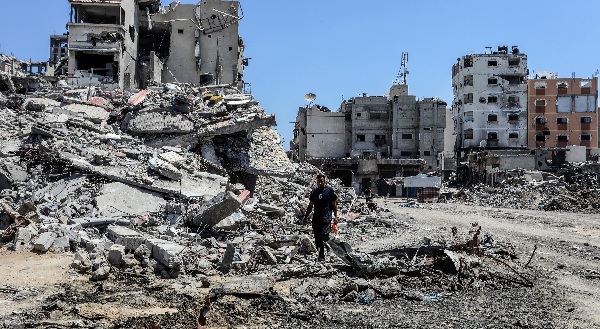In a development reflecting an unprecedented escalation of systematic destruction, Israeli forces on Sunday intensified the demolition of residential homes in Gaza City and Rafah, in both the northern and southern areas of the Gaza Strip. The demolitions occurred alongside ongoing aerial and artillery bombardments targeting homes and displacement tents across the besieged territory.
Eyewitnesses reported that Israeli artillery heavily shelled the eastern areas of Al-Shuja’iya and Al-Tuffah neighbourhoods in eastern Gaza City, while quadcopter drones opened fire on residential buildings in Al-Tuffah. Witnesses confirmed that dozens of homes were demolished using explosives, exacerbating the suffering of residents who face repeated forced displacement and total destruction of their homes.
In Rafah, similar demolitions were reported as Israeli helicopters opened fire on northern parts of the city, indicating an intentional targeting of civilian infrastructure as part of a military campaign marked by mass displacement and destruction.
Since early Sunday, at least 14 Palestinians were reported killed and others injured following a series of airstrikes and artillery shelling that targeted civilian homes and displacement tents across Gaza. A medical source confirmed the killing of four members of the Qannan family in a strike on an apartment in Al-Mawasi area west of Khan Younis, while a woman was killed and others wounded in a strike on a home belonging to the Abu Shamala family in Al-Amal neighbourhood.
A young man from the Al-Najjar family was killed, and others injured, in a drone strike on a displacement tent in Wadi Saber area east of Khan Younis. Three Palestinians succumbed to injuries sustained in previous airstrikes on Khan Younis and Beit Hanoun.
The shelling of a tent belonging to the Abu Assi family in Al-Qarara left six people injured, while four civilians, including three women, were killed in a separate attack on a displacement tent in Al-Mawasi.
In central Gaza, a woman was killed and others injured following an airstrike on the Abu Hweishil family’s home in Nuseirat camp. In northern Gaza, two Palestinians were injured in a strike on warehouses in Sheikh Radwan neighbourhood.
The repeated and deliberate demolition of homes by Israeli forces in Gaza and Rafah indicates a consistent pattern of systematic destruction of civilian infrastructure, in the absence of any apparent military necessity.
Such practices not only constitute a breach of Article 53 of the Fourth Geneva Convention, which prohibits the destruction of property belonging to civilians under occupation, but also reveal a policy aimed at dismantling Palestinian society by eroding the means of survival and forcibly displacing the population.
The targeting of displacement tents, sheltering individuals already forcibly displaced by military operations, constitutes a blatant violation of the principle of distinction between civilians and combatants, and disregards the special protections afforded to civilians and civilian objects under international law.
These actions cannot be isolated from the broader context of the ongoing war, which began on 7 October 2023, and which many observers assert is aimed at forcibly depopulating Gaza of its original inhabitants.
According to the legal definition outlined in the 1948 Convention on the Prevention and Punishment of the Crime of Genocide, the widespread killing, systematic destruction, comprehensive siege, and deliberate starvation of a population are elements that together may constitute genocide.
This war, now in its nineteenth month, has resulted in over 170,000 deaths and injuries, the majority being children and women, in addition to more than 11,000 missing persons, amid the collapse of the health sector, the destruction of hundreds of thousands of homes, and the deprivation of the population of basic necessities for survival.
The situation on the ground reflects not isolated excesses or uncontrolled military actions but a systematic policy targeting the very existence of the Palestinian people. International inaction in the face of these events risks amounting to indirect complicity, further heightening concerns of an even bloodier escalation.



























